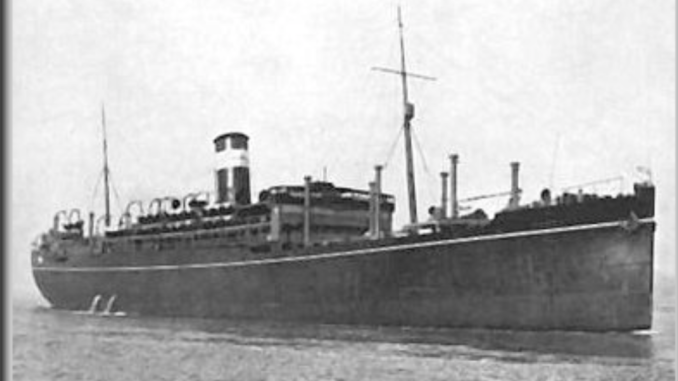
Kermit Belles enlisted at the US Army recruiting station in Timentwa, Washington. Just eighteen years old, like most Americans he wanted to serve his country after the attack on Pearl Harbor. Three of his nine siblings had also joined the military. Censorship rules during the war forbade soldiers and sailors from disclosing their location, even to close loved ones. Not even his parents knew where he or his brothers were after they completed training and shipped out overseas.
HMT Rohna [His Majesty’s Transport Rohna] was a former passenger and cargo ocean liner, identified prior to the war as the SS Rohna. She was requisitioned by the British government in 1940 and converted to a troop transport vessel, to be utilized in moving Allied soldiers and their supplies from wherever they were to wherever they needed to be. Approximately 200 sailors and officers were assigned to her crew.
Private Kermit Belles was already in North Africa, though we don’t know how long he’d been there or whether or not he’d seen any combat. We do know he embarked on the Rohna with about 1,800 other US Army soldiers from the French Algerian port city of Oran, on the Mediterranean coast. Setting sail on 25 November 1943 with four other troop transports, the Rohna joined a convoy enroute from Britain, destined for Alexandria, Egypt.
The convoy was attacked by German forces that afternoon, but sustained no serious damage. The next day, 26 November 1943, Luftwaffe bombers armed with a new type of weapon found the convoy and struck. The weapon was a radio-controlled, rocket-powered missile. Today we would call it an anti-ship cruise missile, but the Germans called it the Henschel Hs-293 air launched guided glide bomb. The bombers launched forty-two of the glide bombs at the convoy. Smoke screens and heavy anti-aircraft fire are credited for forty-one of the new weapons missing their targets. But one of the ship-killers struck the Rohna. Over 1,100 men lost their lives, either immediately or from drowning or mortal wounds. More than 1,000 of those were American soldiers. Approximately 800 survivors were rescued in rough seas.
A decision was made to classify the tragedy and keep it a secret. The War Department reasoned that, because of the heavy smoke cover, the Germans probably did not know that one of their missile actually worked and was enormously, even if tragically, successful. If the Germans found out, they’d be encouraged to build more. And so it was kept secret, even from the families who lost sons and husbands.
In early January, 1944, Belles’ parents received a telegram from the War Department:
“The Secretary of War desires me to express his deep regret that your son, Pvt. Kermit A. Belles, has been reported missing in action since November 26 in the North African area. If further details or other information are received you will be promptly notified.”
The Belles family never found out what happened to their son Kermit. His parents, brothers, and sisters all passed away before the Rohna catastrophe was made public.
The War Department sent hundreds of thousands of telegrams bearing bad news during the war. Unless they died heroically, the vast majority of men and women who served, and died, during World War Two (and in fact in every war) were unknown to the general public save for an obituary notice in the local newspaper. Most quickly faded from the national memory, except in the hearts of their families.
On Monday, please remember those that have sacrificed all for us: observe the National Moment of Remembrance which asks each of us to take a little of our time at 3pm (local) on Memorial Day each year “To voluntarily and informally observe in their own way a Moment of remembrance and respect, pausing from whatever they are doing for a moment of silence or listening to ‘Taps’.”
Question Of The Night: What do have planned for the weekend?
